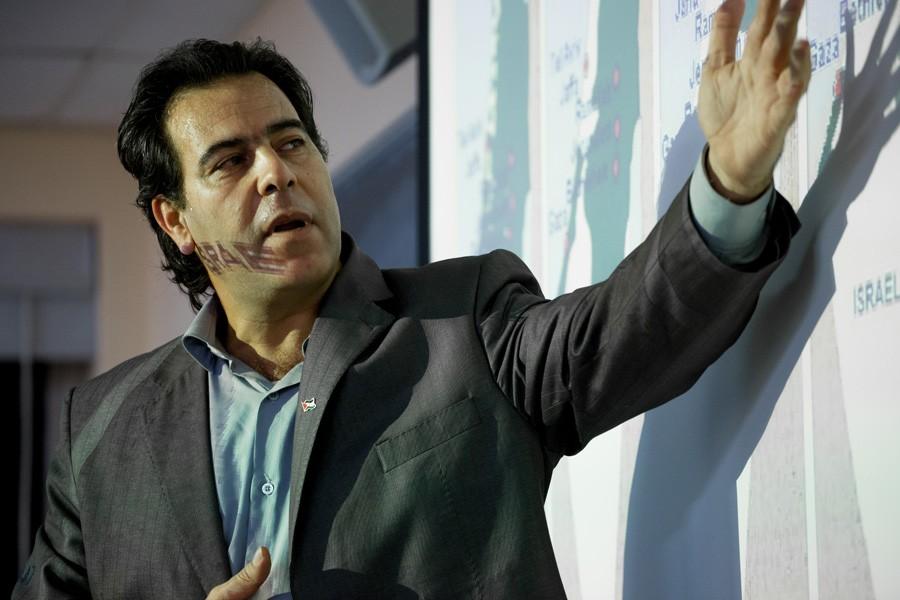Palestinian journalist discusses conditions in Gaza
Zack Laurence/The Daily Northwestern
Gaza journalist Wajeh Abuzarefah explains the change in the political geography of Israel and Palestine since 1948. Abuzarefah spoke about current conditions in Gaza at an event co-hosted by Students for Justice in Palestine and Northwestern Divest.
March 1, 2016
Gaza journalist Wajeh Abuzarefah called Gaza a “small open air prison” with 2 million Palestinians at an event Monday hosted by Northwestern Students for Justice in Palestine and Northwestern Divest.
Abuzarefah, a journalist for NBC News based in Gaza, discussed the evolution of the political condition of Gaza and the ways Israel has dealt with Palestinians in the territory. He highlighted current living conditions in Gaza and what he identified as the causes of those conditions. The talk, held in Parkes Hall, included a Q&A with the approximately 25 people who attended.
Abuzarefah began by showing images of Gaza before and after violent conflicts with Israel. In the past six years, there have been three confrontations between the two, he said, with the last one, in 2014, nearly completely destroying Gaza’s infrastructure, he added. Though Gaza residents were given warning before bombings began, he said the emotional and economic toll from losing homes was staggering.
“We’re not talking about buildings only,” Abuzarefah said. “We’re talking about people’s lives. It was not for fighting. It was to push Palestinians to leave Gaza.”
Still, restrictive laws make it nearly impossible for Palestinians to leave Gaza, he said. Restrictions on movement prompt Gaza residents to give up educational opportunities abroad and deny them access to medical care available in neighboring Egypt, he said. Abuzarefah said he himself lost a Nieman Fellowship from Harvard University because he was unable to leave the country.
People are not the only ones who are restricted at the border, he said. Goods and materials needed to rebuild Gaza from air strikes are either blocked from entry or sold at substantially higher prices by Israeli vendors, Abuzarefah said.
“With a situation like that and problems like this, of course people will start thinking about their life,” Abuzarefah said. “It is hard to believe to anybody — Americans, the United Nations, even the Arab Countries — because nobody helps. Everybody talks about helping, but nobody helps us.”
Abuzarefah said the situation in Gaza is not a humanitarian problem but a political problem. Though the international community speaks about peace, there has been no improvement for Gaza residents, he said.
“The meaning of peace is to change daily life of the people to be better than before,” Abusarefah said. “To them peace means maintaining the security of Israel and continuing the occupation.”
Abuzarefah said these are not isolated incidents but long term efforts targeted at Palestinians.
Weinberg freshman Aaron Boxerman said he thought Abusarefah offered a powerful perspective, but could have benefited from inclusion of additional points of view in his speech.
“The speaker articulated the Palestinian narrative very strongly, but I do wish he had engaged a little more with some of the rationales of the other side, because I think it would have actually strengthened his argument,” Boxerman said. Engaging with all the stuff that’s happening to the people in Gaza in a vacuum … reduces the situation and takes away its complexity.”
Abusarefah also spoke about how the problems and political situation in Gaza are different from those in the West Bank. Aneesa Johnson, events coordinator for SJP, said she appreciated Abusarefah’s perspective as a journalist from Gaza and his distinction between the two regions.
“It’s always important to learn about the specific issues within Gaza because it is a different situation than in the West Bank,” the Communication sophomore said. “He is the ideal person to speak on it because he is from Gaza and he is a journalist as well.”
Email: [email protected]
Twitter: @matthewchoi2018


